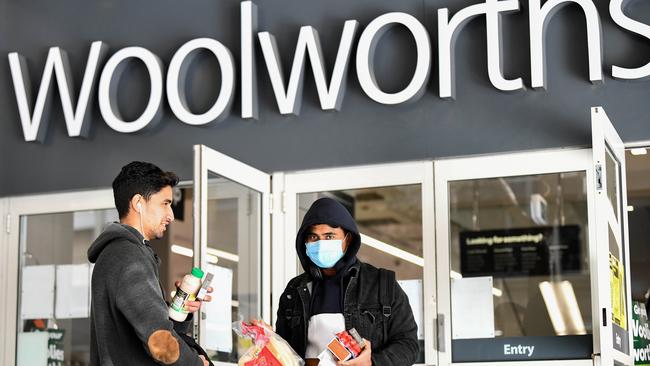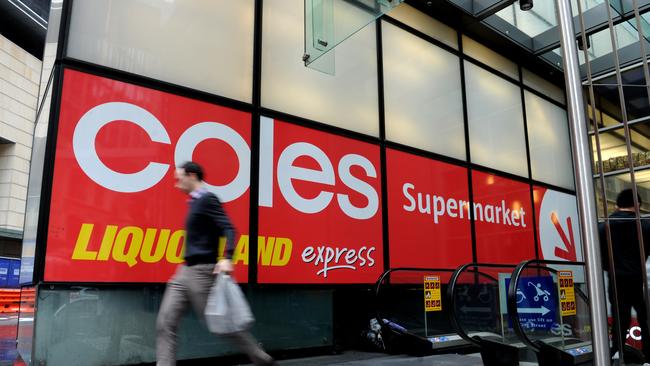Supermarket competition very strong amid ‘price gouging’ allegations
Woolworths and Coles declare that competition in food and grocery remains as strong as ever, as part of efforts to dismiss allegations of price gouging or profiteering.
Business
Don't miss out on the headlines from Business. Followed categories will be added to My News.
The nation’s largest retailer Woolworths has hit back at suggestions the supermarket sector is dominated by a cosy duopoly run by itself and rival Coles, arguing shoppers were treated to “high levels” of competition and choice.
In its submission to a Senate inquiry on supermarket pricing and market power, established by the Greens and backed by the Albanese government, Woolworths said competition among supermarket players had intensified in recent years.
“The empirical evidence demonstrates that Australian consumers enjoy high levels of supermarket competition and choice. The evolution of the market over recent years has intensified levels of competition from those observed in prior reviews,” the Woolworths submission said.
Meeting the allegations of price gouging levelled at the supermarket sector head on, Woolworths said it was crucial for the chain to remain price competitive to keep customers loyal, and keep them coming back, with other international players such as German supermarket Aldi and retail behemoth Amazon able to exploit any artificially high prices designed to ramp up corporate profits.
“With the arrival of three of the world’s biggest and most competitive retailers (Aldi, Costco and Amazon) in Australia, consumers have even more choice. Being price competitive is critical in trying to win our customers’ shopping basket.
“Customers have taken advantage of this choice, with 86 per cent of Woolworths customers also shopping across Aldi, Coles and/or IGA in the last 12 months. Around one in six have shopped with another grocery retailer on the same day they visit Woolworths. It is therefore critical that we offer the best possible value to our customers, as they can (and do) easily and readily shop elsewhere.”
Amid a growing cost of living crisis, which has caused the Albanese government to become increasingly unpopular as it is being blamed, supermarkets have been put under the political spotlight with some accusing it of price gouging.
Woolworths in its Senate submission said throughout this recent inflationary period, it has taken steps to provide affordable grocery products for all Australians. It said given the $120bn supermarket sector was a high-volume, low margin industry, it actually only recovered a slim portion of sales into profits.
“Grocery retail is a high-volume, low-margin sector and Australia has one of the most efficient and productive grocery sectors in the OECD. We make around 3.6c in every $1 in our Australian Food Group (supermarkets).
“This is before our investment back into making our business and indeed the Australian grocery sector more resilient, innovative and efficient through our balance sheet.”
Much of the furore around supermarket pricing has centred on meat prices, with farmgate prices falling but meat prices in the supermarkets hardly budging, leading some to argue this was evidence of price gouging as well as the supermarkets squeezing farmers.
Woolworths strongly defended its meat pricing in its Senate submission, saying for beef, for examp, by buying on forward contracts, it can offset some of the volatility in spot livestock markets, helping to smooth the peaks and troughs through the cycle for farmers and secure high-quality, year-round supply for customers.
“For this reason, spot saleyard prices are not an appropriate guide to our costs. For example, in 2023, as spot market prices reduced to record lows, for cattle we continued to pay our suppliers in line with our settled forward contracts and worked with them to ensure sustainable pricing. For lamb, we continued to partner with our long-term suppliers paying above spot market rates to ensure they had the confidence to feed and manage their stock through the drier periods.”
Australia’s former competition boss Allan Fels said he believes there is insufficient competition in the food and grocery sector as evidenced by poor prices put to shoppers.
Mr Fels argued in a lengthy report on price gouging commissioned by the ACTU that supermarket market power is exercised over farmers and many other suppliers and that in addition, the gain in profits from this is not passed on, certainly not promptly or fully, to consumers because of market power and a lack of competition in the product market.
Mr Fels said in his report – which also looks at pricing in aviation, financial services, childcare and pharmaceuticals – that price transparency for those down the supply chain of supermarkets is low, and this is one barrier to effective price transmission.
“Supermarkets have not been transparent with customers about price histories of their displayed items and their correlated discounts,” his report said.
Mr Fels said Australia’s food and grocery sector, led by Woolworths and Coles, is among the most concentrated in the world and supermarkets and grocery related submissions led complaints to the Inquiry with 325 submissions received raising issues with major retailers. This was more than twice the next largest category of complaints received.
Mr Fels, who was chairman of the ACCC between 1989 and 2003, has recommended there should be a comprehensive ACCC inquiry into competition and prices in the retail food and grocery industry.
He has pushed for the Food and Grocery Code – a code between supermarkets and suppliers – should be fully mandatory rather than voluntary as it is at the moment, and the Food and Grocery Code should also investigate creating a price register for farmers to assist them in understanding market prices across primary industries.

Coles has defended itself from accusations of price gouging and profiteering at the expense of suppliers and shoppers, arguing in its Senate submission that while food and grocery prices have increased in recent years – mostly driven by price hikes from suppliers – its profit has remained largely stable.
The group said while supermarket prices may have increased in its stores, this has not translated to greater net profit in 2023 for the retailer.
“Coles operates under a competition and consumer regulatory framework that is world leading, robust and fit for purpose.”
The nation’s second-largest supermarket chain said a number of factors influenced the price of groceries, from tax, transport, labour costs and packaging to natural disasters and supply chain disruptions, and that its annual profit was inline with other supermarkets overseas.

Coles has also strongly argued that it has been swamped with requests from suppliers to lift their prices, which had fed through to higher shelf prices for food and groceries. In the first six months of 2021, Coles received 1,101 requests from suppliers for cost increases, equivalent to 42 per week and this almost doubled to 79 per week in 2022 and 73 in 2023, largely driven by inflation and increases in global commodity prices.
However, Coles had kept the rise in its prices below that of inflation.
The defence of its operations, supplier relationships and prices from Coles was fleshed out in a submission to the Senate inquiry into supermarket prices and market power which was pushed by the Greens and in December was backed by the Albanese government.
Some have accused Woolworths and Coles of price gouging, as well as not reducing prices for certain products, such as meat, when farmgate prices for these agricultural products have dropped significantly.
In early submissions, there has been a split already among primary producers with some accusing the supermarkets of price gouging and predatory pricing while others have defended the chains to claim they enjoyed a good commercial relationship and were obtaining competitive pricing for their produce.
Coles said Wednesday a key driver of supermarket price increases recently had been cost price increase requests from its suppliers and farmers.
“Coles received an average of over 70 requests per week from suppliers and farmers in fiscal 2022 and fiscal 2023 (almost double the level of fiscal 2021 requests). Coles is also impacted by the increased cost of doing business with increases in energy, labour, logistics, packaging, interest and tax costs.”
It argued despite these rising shelf prices, cost pressures within its own business and supply chain shocks caused by overseas events, its annual profit had remained “largely stable” for the last five years – underlining the fact that no price gouging was taking place.
“Despite the impact of inflationary global and local events over that time, including a pandemic, the conflict in Ukraine, natural disasters and other supply chain disruptions, Coles net profit after tax has remained largely stable over the last five years with minor variation year-on-year.
“That is, while supermarket prices may have increased in our stores, this did not translate to greater net profit after tax in fiscal 2023.”
It said its spend on suppliers and services is its biggest operational cost, totalling $32.3bn in fiscal 2023 out of sales revenue of $40.5bn.
“Coles values long-term partnerships with suppliers and enjoys decades long, positive relationships with many suppliers.”
Coles said it is a “partner of choice” for suppliers not only due to its scale and network, but because Coles invests in the long-term viability of its supplier partners.
“It is not in the interests of Coles, our suppliers or the community for Coles to have fragile or disrupted supply from our partners. Our suppliers are subject to the same cost pressures experienced across households, as well as domestic and global economies, and we work with them to adjust to challenges and help them grow and prosper.
“This includes a process for suppliers to submit cost price increase requests for their products when their costs are impacted by inflation and other factors. We also support our suppliers through grants and payments including.”
The retailer said much of the profit it makes is returned to the community with 80 per cent of Coles’ after-tax profit used to pay dividends to its more than 440,000 shareholders, many of whom are retail shareholders: mums, dads, families and retirees. The remaining profits were reinvested in the business.
Originally published as Supermarket competition very strong amid ‘price gouging’ allegations



